|
Welcome to A&A. There are 32 reviews in this issue. Click on an artist to jump to the review, or simply scroll through the list. If you want information on any particular release, check out the Label info page. All reviews are written by Jon Worley unless otherwise noted. If you have any problems, criticisms or suggestions, drop me a line.
|
|
|
A&A #153 reviews (2/23/1998)
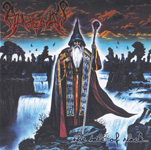 Auberon
AuberonThe Tale of Black (Black Mark Production) In the finest tradition of European metal, Auberon combines classical musical lines with the power and agony of shredding chords and shrieking vocals. Black Mark, in particular, has specialized in bringing this sort of music to the forefront, and Auberon is a quality band. Reminds me a bit of Amorphis, though Auberon focuses more on the heavy side of things, perhaps somewhere near where At the Gates ended up. Either way, a fine place to be. Not near as gothic as Edge of Sanity, but the way Auberon shifts musical gears so effortlessly does remind me of that fine endeavor. Sure, there's an immense debt to be paid to Iron Maiden (I've been saying that a lot, and I'm gonna continue to say it when necessary), but hell, let's just put those bastards in the Hall of Fame and get it over with. The mix is a bit thin in the middle, resulting in a somewhat hollow sound. I was able to correct this to an extend by shifting my equalizer, so no big worry. On the whole this album is a prime example of why metal is still a vital genre.
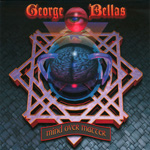 George Bellas
George BellasMind Over Matter (Shrapnel) While this album, like Bellas's previous Shrapnel solo outing, was assembled from various parts, it doesn't sound nearly as artificial. Bellas's solos are fluid and impressive, and he has a better feel this time out. A much stronger outing altogether. And it all began in the studio. Bellas got a little more help, but he also had learned how to use technology better. I mean, everything is mixed on a computer today, but it doesn't have to sound that way. This time, the songs are much more grounded in "real time", as it were. Bellas still doesn't pay enough attention to the underlying structure of his songs, many of which are solos strung together by middling fare. And he's a bit too happy with whipping out the virtuoso chops and ignoring the real magic of music, which is to communicate. Overall, however, this is a huge stop forward. Bellas is getting the hang of things, and that bodes well for future endeavors.
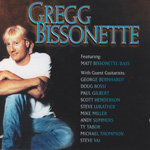 Gregg Bissonette
Gregg BissonetteGregg Bissonette (Shrapnel) Gregg Bissonette is a versatile and talented drummer. Yeah, he's best known as the guy who pounded skins for David Lee Roth after Roth and Van Halen split the first time. But he's also played with plenty of other folks, from Maynard Ferguson to Brian Wilson to Andy Summers. If only such a variety had been showcased on this disc. The songs (with the exception of a couple covers) were written by Bissonette's brother Matt, who also produced the disc. A who's-who of guitarists provided support, names like Steve Vai, Paul Gilbert, Steve Lukather and Andy Summers. Too bad the songs sound like mere ramblings of studio hacks. Matt Bissonette has played in at least as wide an array of bands as his brother, and yet his songs stick to a strange hard rock fusion sound. Uninspired. Technically proficient, but nothing special. Which is too bad. Sometimes this stuff works out; sometimes it just don't. This is one of the don't times.
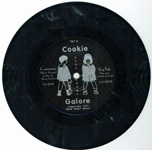 Cookie Galore
Cookie GaloreCookie Galore 7" (Heat Beat) Some serious electronic goofiness. On "Communion", the vocals waft (they're a high alto, so it's not like were talking about babydoll singing, but still) over very sparsely populated beats, with some keys and bass creeping in from time to time. Not entirely haunting, and I don't think that's the point. The band sets a great mood, one that's arrogantly languid, almost as if toying with the listener. I kinda like that. The other song (I couldn't determine if there was an a-side) is "Leaves & Philosophies", which is much more raucous, comprised of assembled live beats and a melange of incoherent vocals. Not exactly normal, so I'm intrigued. A lot of creativity bouncing around on one little slab. There's a note on the sleeve that recommends a newer needle. I have a dreadfully old needle, and it worked just fine. In any event, don't fear. Stroll into the unknown with a strut, and you'll do fine.
The Crayon Theatrical The Crayon Theatrical (demo) Nominally released on the Skeptical Cats' imprint, this tape showcases the sound of another Ohio outfit. Intense, yet restrained pop. Not folk; this is acoustic pop (with some electric guitar on the edges). A bit too reliant on the easy syncopation. That exaggerated backbeat gets old after a while (though Poi Dog Pondering is still revered in certain circles, even after no major answered the phone). If it weren't for that somewhat grating affectation, though, I think I would dig this much more. Sure, it's easy pseudo hippie-pop fare, but the Crayon Theatrical does have some interesting things to say, even if I'm not grooving so much on the music. The recording itself is well-produced, with perhaps a bit too much treble in the mixage (an unusual problem for demos, which almost always come out with far too much bass). Intriguing.
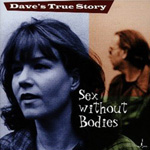 Dave's True Story
Dave's True StorySex Without Bodies (Chesky Records) The "alternative" bands at the forefront of the whole loungecore movement (a term I despise, by the way) seem to think that the idea is to play mellow music with horns and hope the listeners are too drunk on their martinis to notice that they're merely purveying schlock. Which is too bad, because some of the most talented songwriters of this century wrote songs that have been cast in this sound. I mean, if you want to say that Billy Corgan is a better lyricist than Cole Porter, fine, but don't run into me after I've had a couple beers. That tangential extended introduction is my way of saying that Dave's True Story understands that mellow, pseudo-jazzy music doesn't have to be insipid. The lyrics are clever and evocative, delivered by Kelly Flint's versatile alto. Not husky, but plenty of verve. The Dave in question is David Cantor, who wrote all the songs (with the exception of a cover of "Walk on the Wild Side") and played a sly guitar. The songs run from spare arrangements to full lush orchestrations, but what always sparkles are the lyrics. These songs really aren't even aimed at the current trendy lounge crowd. I mean, how many of them would recognize the reference in the song "I'll Never Read Trollope Again"? Truly sophisticated, even as the lyrics undercut that high life with biting sarcasm. In other words, great stuff. Intimidating, challenging and glorious. There's nothing even close.
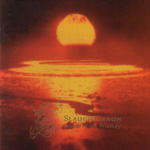 Dawn
DawnSlaughtersun (Crown of the Triarchy) (Necropolis) Produced at Peter Tagtgren's Abyss studios, these Swedes show that black metal isn't necessarily crap. Slaughtersun doesn't quite out do the fine work Tagtgren has done with the Abyss (a sidelight of his Hypocrisy duties), but it's pretty damned good. Sounds a lot like Iron Maiden playing black metal, without much keyboard interference. The drums eternally cascade and the guitars whipsaw through a series of triplet runs. Really loud? Yep. Nutcrushing? Sure. A complete and utter adrenaline rush? Abso-fuckin-lutely. Adherents to the original black metal ideal will cringe at the thought of, say, songwriting or the acoustic interlude "To Achieve the Ancestral Powers". Actually, Dawn sounds a lot more like latter-day Hypocrisy than anything else. Though that makes sense, and I'm not complaining too much. The sort of album that will appeal to more traditional metal fans. A sell out? More like an evolution. The ultimate extreme will always fall to the center. A musical law of entropy, or something like that. There's an old joke about inevitability, but I'd best not repeat it. Just sit back and enjoy.
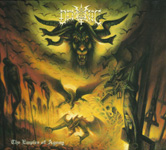 Demonic
DemonicThe Empire of Agony (Necropolis) Alright, all you black metal fans who found the Dawn album a little, shall we say, unworthy? Try on Demonic for size. Rage and brutality, with no quarter asked for or given. Now, there's still a coherent songwriting style (and still very much Iron Maiden influenced), but this stuff is much more unrefined. As the notes on the back of my promo pak say, an "angelraping sound". Heh. Okay, but despite the undeniably more intense sound, Demonic is still a second or third-generation black metal band. This stuff is well-produced (a bit treble heavy, but with all those cymbals crashing and stuff, well, that's kinda natural) and like I said, the songs do follow a structure of sorts. With some awesome riffage grinding the whole process along, I might add. A nice wave of agony and pain. I gotta admit that I like the Dawn album better, but I know plenty of folks who will lean to the Demonic side of things. This is the more extreme album, and it's pretty damned impressive. Sniff, sniff. Tears in my eyes. Black metal has grown. How can it be? Guess it's time for another past-the-edge form to take its place.
��� Destroyer Destroyer (demo) A Romanian band that plays a sort of techno version of the Pantallica sound. Sounds a lot like the semi-industrial feel Pantera got on its Cowboys from Hell album. I think the odd sound comes from the recording procedure, but who knows? The songs are kinda generic and dated by American standards, though I like the feel. The playing is more than adequate, but the writing simply doesn't pass muster. The largest record concern in Romania released a full-length from these guys, and I can understand how this stuff would go over very well in places not quite as oversaturated with this sound as we Americans are. Music here has moved on. Destroyer needs to do more innovating and less imitating.
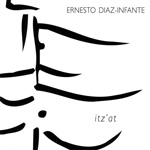 Ernesto Diaz-Infante
Ernesto Diaz-InfanteItz'at (Pax Recordings) Not what most folks think of in terms of solo piano work. Ernesto Diaz-Infante is a master of subtlety and grace, allowing his ideas to grow slowly within his compositions. Some might toss this in the realm of new age, but I don't think so. While generally subdued and deliberate, Diaz-Infante's pieces are anything but trite and simplistic. Indeed, the sparse sound and slow-but-constant flow have a way of drawing the listener into Diaz-Infante's world, a place of beauty and intensity. The playing itself is somewhat choppy and inconsistent. Diaz-Infante is not a world-class player now, though he just might get there someday. What he can do is communicate his ideas through the piano, something many virtuosos are unable to do. A trip to another world. Not the most sophisticated writing or playing by any stretch of the imagination, but Diaz-Infante has what is required most: the gift of passion and emotion, which he conveys quite impressively.
���������������������������������� 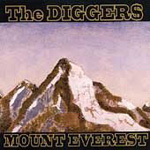 The Diggers
The DiggersMount Everest (Big Deal) Produced by Charlie Francis of the High Llamas, a band best known for its slavish devotion to the Beach Boys, it should come as no surprise that the Diggers are equal devotees to the "other" great 60s pop band, the Beatles. With the exception of the vocals, which do not imitate John, Paul or George (no one in their right mind would try to replicate Ringo Starr's voice), that is. The music, on the other hand, is a mishmash of Beatles concepts from, say, 1966 on. There are no riffs stolen, no bass lines thieved. This just sounds like the Beatles. A lot. Not a horrible thing. The Diggers are quite adept at this form, and the songs are uniformly well-written and performed. But what the band doesn't do is relate the pop ideal of the late '60s to today's concept of pop. This is retro stuff, and nothing more. And that's the final failing. Sure, there are some nice period pieces here, which is an odd thing to say about a new album. I'm just waiting for something more. I guess I'm in the wrong boat.
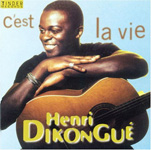 Henri Dikongue
Henri DikongueC'est la Vie (Tinder) The liners credit Henri Dikongue as being part of a quiet revolution in African music. See, Dikongue doesn't play throbbing dance music, and he doesn't employ an elaborate percussion section. He plays "music straight from the soul", which is a phrase I once saw on a Julio Iglesias album. But even as I read this, I was listening to the music, and the music told another story. Dikongue's songs are quiet, at least in terms of volume. He does get a nice Afro-Caribbean groove working on such songs as "Ndol'asu", but even as the beats drive the music, the focus is firmly set on Dikongue's quietly expressive voice. Instead of being merely a "AAA" alternative to the more active world beat music, Dikongue keeps his arrangements simple, allowing his many references to achieve their full, intended effect. Yeah, I guess this stuff could be played on generic "lite" radio, but the difference would be apparent to even a casual listener. Passionate music will always have an audience, no matter its sound. Dikongue never overplays his hand, and his arrangements keep any potentially treacly elements to a minimum. Beautiful That's all..
������������������������������ 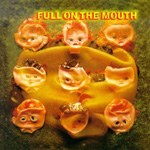 Full on the Mouth
Full on the MouthCollide (Pioneer Music Group/Atlantic) So the glossy has guys with bad perms staring ominously at the camera. With a name like Full on the Mouth, I was waiting for another cheap Pantallica ripoff. And well, the chord progressions just might fit that category. But Full on the Mouth is something like a mix of Whorgasm and Skrew. Catchy glam industrial grooves with plenty of techno overwashing. Definitely best appreciated at volume, but accessible enough to play at your average party. Alright, so this easy music. No doubt about that. Did it take a huge chunk of inspiration to come up with the riffage and lyrics? Of course not. But it does take talent to find good hooks, and those are in abundance. Pop industrial stuff wears on me quickly, so I'm not sure how long I'm really going to be digging this. But right now, I've got it cranked. And that will work for today.
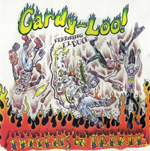 Gardy-Loo featuring El Duce
Gardy-Loo featuring El DucePerverts on Parade (Off the Records) Perhaps the final musical legacy of El Duce (Eldon Hoke), who is best known as the lead singer for the Mentors. He died about a year ago, most likely from overconsumption of alcohol and drugs. A misogynistic misanthrope, El Duce's recorded record is full of patently offensive songs. The only reason he did not quite achieve the fame, as it were, of G.G. Allin is because he didn't eat his shit on stage every night. On occasion, perhaps, but not every night. Gardy-Loo is a Tampa metal band, in the sorta Euro-glam style. The band acquired a bit of a hardcore bent to more properly back up El Duce, but you can still hear some Crimson Glory back there. These songs are not the most extreme I've heard out of El Duce, but they are among the best in terms of the production. This album sounds good. Top-notch sound, whether I really wanted it or not. Take offense if you like. I happen to think songs like "Senior Citizen Sodomizer" and "Clitoctomy" are so beyond the pale, they're hilarious. You make your own call. Not for the weak of heart, or anyone who professes to be a "normal" member of society. Luckily, there are plenty of us perverts out there. A worthy tribute, which should really frighten all those soccer moms out there.
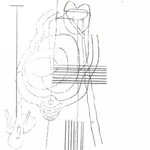 Gastr del Soul
Gastr del SoulCamofleur (Drag City) David Grubb and Jim O'Rourke return, with Markus Popp contributing vocals on a few songs. Not singing, really, but some spoken word stuff over the usual Gastr del Sol fare. Unusual is one way to look at it. No Gastr del Sol album sounds much like any other, and so on this one Grubb and O'Rourke add not only vocals, but horns, strings and a clarinet where they feel necessary. The result is as disconcerting and wonderful as ever. Probably more disturbing than usual, because the horns generally play normal lines, while the rest of the music is just that much off-kilter. The sort of music my grandma might like, except that it's just a little bit weird. Not a lot, and that's the key. The slight deviation from what's expected produces a chill that's hard to shake. It becomes all too clear that this music was not produced by regular human beings. Makes you believe in aliens. Well, maybe that's overstating the case. It is true, though, that this is another fine Gastr del Sol outing, and while it shares the spirit of its predecessors, it doesn't worry too much about following in the earlier discs's musical footsteps. Hey, I'll always be here to listen.
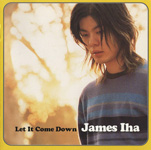 James Iha
James IhaLet It Come Down (Virgin) James Iha has a bit more on the line here than the average member of a superstar band releasing a solo album. After all, Smashing Pumpkins leader Billy Corgan has made it clear that Corgan not only writes the music, but plays most of the instruments as well. Which leaves Iha and his other bandmates as highly-paid touring pros. So can Iha write songs? Can he actually play? Of course. This album will probably surprise Pumpkins fans with its pure pop core, but the fact of the matter is, Iha has a real knack for kicking out the slightly icky pop tune. Easy-rockin', rootsy love songs that roll of the discer smoother than Maker's Mark out of a jigger. Somewhere between Big Star and the dBs, with a heavy dose of the Eagles. Iha has a great voice for this stuff, just enough of a rasp to make him sound distinctive. This music may not be as adventurous as Smashing Pumpkins recent efforts, but it works much better. Perfect timing for this sort of record, too, what with the huge pop resurgence and all. I wasn't expecting anything, and Let It Come Down just ran over me. More than competent, Iha sometime really amazes. Well worth the time.
������������������������������ 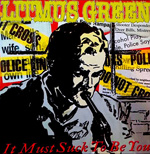 Litmus Green
Litmus GreenIt Must Suck to Be You (Tacklebox-Cargo) Oh, what wonderful paranoid musings we have here. Litmus Green has expletive-riddled rants against organized religion (more than one song concerning Jesus personally), Jenny Craig, the Clintons, Operation Rescue and plenty more. A fairly generic buzzsaw hardcore attack accompanies these screeds, though I'm not sure what other music would sound better behind "Jesus fucking H. Christ, just shut up and let me live my life?" I mean, we're not talking about brain surgery here, just a whaleboat full omnidirectionally directed anger. Do the songs actually make sense? Is there a coherent political agenda? Have the guys discovered the mythical fourth chord? Of course not. One of the ultimate extensions of the NOFX "He's more punk than..." bit. Lots of uncoordinated shouting, with a main course of dreadfully-played music. Strangely enough, it's also a hell of a lot of fun. The amusement factor runs high.
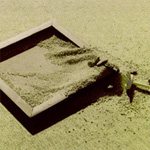 Brian McMahon
Brian McMahonAn Inch Equals a Thousand Miles (Crab Pot) I just re-read my review of McMahon's last effort, the excellent 17 Volts. As usual, I managed to completely punt in the description department, with the exception of calling the album brilliant. That is true. And this album (really an album, too; McMahon sent me a delicious vinyl copy) follows down the same road. Sparse arrangements (most often guitar, bass and drums, with some extra sound stuff bounding around when the mood strikes) of off-kilter pop songs. McMahon's voice is kinda fragile sounding, which adds an endearing quality to the "as-it-happens" lyric style. A modern version of beat poetry, really. The images are everyday, but McMahon juxtaposes those ideas to bring about new meanings. Not only is the average worth celebrating, in its own way an average life can be extraordinary. Elegantly understated, An Inch Equals a Thousand Miles is another stunner. Quietly amazing. McMahon sure knows how to use a minimal sound to great effect.
MISS Civil War (J-Bird Records) Not at all what I expected. The elements are the same as on the demo I reviewed a few years back, but the result is completely different. On the old tape, MISS focused on a more commercial sound, blending techno and r&b elements into a fairly attractive, if a bit too earnest, sound. The music is much more subdued on this album, which suits Lara D'Anna's voice well. A much more introspective outing for the band. Even on the more upbeat songs, it is obvious that the mirror is faced inward. The music, while well-written, still has a bit of a "computer" sound to it. A bit empty in the middle, somewhat artificial-sounding. D'Anna's vocals distract from that problem, but it still lies in wait. On the whole, though, this is a much more assured and confident sound for the band. I wasn't sure where MISS was headed when I heard the demo, but this firmly entrenches MISS in the more adventurous side of the music world. From evocative, wrenching ballads to peppy pop tunes, MISS wanders around admirably. And while there is something of a schizophrenic sound, I have to say I liked this. Not what I expected, and that almost always means good things.
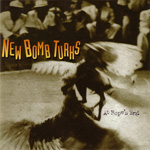 New Bomb Turks
New Bomb TurksAt Rope's End (Epitaph) Recorded in Columbus and Sweden, the results are the same: the usual unique New Bomb Turks punk approach to bar music. Fast, thrashing and tuneful, with the occasional flash of piano or horns. The songs themselves don't always live up to the band's best, though at the breakneck paces some have been put through, perhaps I'm not getting a great idea of what the songs really are. I will say that there is a definite sound difference between the two studios used. The songs done in Sweden are missing some power in the middle. They're also, in general, done a bit too fast. Too uneven to call brilliant, this disc suffers from a serious lack of focus. Perhaps it's the sequencing, perhaps I'm just not quite able to launch myself into the band's energy. Dunno. Something bugs me. On the whole, though, a satisfying album. New Bomb Turks are a band that must be seen live to completely appreciate, anyway. Oh, these recordings are good (their previous Epitaph outing, Scared Straight, was great), but the show's the thing.
������������������������������ 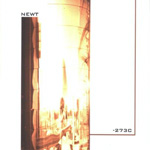 Newt
Newt-273C (Quantum Loop) While the enclosures for the two Quantum Loop albums reviewed in this issue don't say so, I would guess that QL is associated (if not run by) the fine folks at 21st Circuitry. They do share the same address. But I can understand the differentiation. Newt is full-on electronic, completely sterile in sound and processed in nature. There aren't any vocals to speak of (with the exception of some unintelligible samples), and the songs live or die in their electronic terrarium world. Hard to handle. Oh, the songs themselves are entrancing, but assimilating all of the information presented is a bit difficult. Which sounds odd to me, because Newt rarely has more than three sonic elements in motion at any one time. I'm just trying to find a motive, a creative reason for what I'm hearing. It's there; I just haven't found it. Oh, did I mention this sounds a lot like the FLA of 10 years ago or so? Yeah, I like it. Retro-futuristic. Like Brazil, y'know? Cool enough.
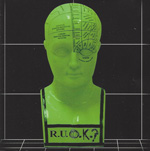 R.U.O.K.?
R.U.O.K.?R.U.O.K? (Quantum Loop) Performance art, in the very best way. The music that accompanies the spoken word pieces reflects the theme of that piece, and thus bounds about a bit. The cover sticker calls it "modern ambient techno", which doesn't even begin to explain. The star of the songs is what is said, but the music behind it is a wonderful mix of guitar and keyboards, with plenty of experimental touches. Sometimes the words don't make sense, and sometimes the music gets just as confused. A match, in other words. Oh, this is strange stuff, but then what do you expect from a guy (Jim Harris is his name) who thanks Laurie Anderson "for making me realize I don't have to learn to sing". The final exhortation is to "Listen with headphones!" He's right. This is music that can envelop, but only if it is presented at high volume in a setting where there are no distractions. Lights off with headphones works damned well. Spooky and adventurous, R.U.O.K.? is a great experience.
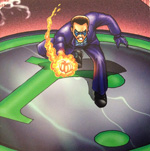 Renfield
RenfieldHelp Is Coming (demo) A band that simply doesn't want to make sense. The vocals are completely unrestrained and generally out of control, and the band (which consists of bass, drums, viola, trombone and sax) most often plays somewhere around a tune. Some sharp, some flat and generally just off the beat. Obviously adherents of John Zorn, great musicians who aren't afraid of a little chaos. Is this the music of sane folks? I can't say. But it swoops, swirls and soars above mundane music. The lunatic fringe of jazz-rock (on the acoustic side, as opposed to the amped up fusion version) couldn't have finer members. Renfield avoid the trap of constant lunacy, which would dilute the effect. Instead, the band vamps about for a while before really kicking in once or twice each song. And what kick it is. Leaves me breathless in agony and joy. A visceral treat. This is music that demands your very lifeblood. Surrender or face the consequences.
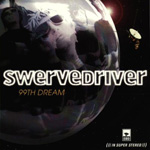 Swervedriver
Swervedriver99th Dream (Zero Hour) Overpowering prog pop anthems appear to be one of the waves getting back to the future. The new Radiohead is chock full of epochal prog-pop ramblings, and the new Hum has also gotten some serious buzz. Yeah, Swervedriver isn't quite in the same territory as either of those bands, but the lines of sight are clear. Actually, Swervedriver gets as close to the pop psychedelia revival sound of six or seven years back (remember My Bloody Valentine?) as anything I've heard since. The vocal melodies are sweet, but the music and unerlying effects don't hesitate to drop a little dischord in from time to time. Complex and rambling, the songs take Beatles pop (of the 1969 sort) to a logical extreme. I realize that I am repeating myself, but hell, everyone should understand what I'm talking about now. Within the confines of an intentionally messy construction, the songs do cover a wide range of sounds and emotions. Gorgeous, though, as you would expect. I didn't like this sort of stuff last time round. Maybe I've matured (the horror!) or maybe I've simply broadened my tastes enough. Whatever. I like the stuff now, and 99th Dream is a positively shimmering experience. An album that demands full attention.
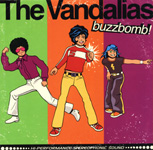 The Vandalias
The VandaliasBuzzbomb! (Big Deal) Three brothers (and a drummer who is not a blood relation) who infuse retro power pop with punk sensibility. Kind of imagine the Sweet (first album, Chinnichap stuff) played in a sanitary fashion but still with a Replacements-style attitude. All the requisite musical cliches intact, of course. And those cliches get kinda annoying fast. When the band lets go and really focuses on its own ideas, rather than reaching for the grab bag f what has already passed, the results are quite a joy. The title track is a great raver, but the next worthwhile song comes four tracks later with "Hey Kari G". This inconsistency drives the album. Are the Vandalias a retro act, or are they bringing the music forward? It sounds like the band itself cannot decide. And that wrenching question never gets answered. Oh, there's some wonderful pop stuff (among the retroid stuff, "Anywhere You Go" is awful keen), but the Vandalias wore out quickly. Tasty, but watch out for the stomach ache.
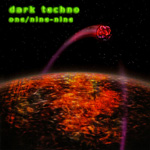 Various Artists
Various ArtistsDark Techno--One/Nine-Nine (Quantum Loop) If you want to know where Quantum Loop intends to play, this here's a good blueprint. A number of 21st Circuitry acts (as you should expect) and plenty of other sorts. The tracks here are generally remixes, although there are some exceptions. A nice showcase of experimental electronic stuff, all on the very mechanical and sterile side. While certainly there are references to Tangerine Dream and Kraftwerk, etc., all of the music here can directly be traced to the early days of FLA (whose influences include, well, see above...). That's not a bad thing. And while the roots may lie in Vancouver, the threads have spread worldwide, with plenty of variation and improvement. Some of the best tracks are by folks apparently without recording deals. I really dug Octaine's "Reflecked to Dust" and Nerve Filter's "Ritalin", and neither of those has any reference to a label or such. Dark techno? Well, not really in a gothic sense. But the level of originality is high. A good sampler, one that makes me want more.
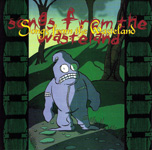 Various Artists
Various ArtistsSongs from the Wasteland: A Tribute to the Mission (Reconstriction-Cargo) That would be the Mission (U.K.), of course, the group that splintered from an early Sisters of Mercy line-up and made its own waves among the nascent gothic culture. I've got a couple friends who swear by the band, though I must admit I was listening to the Scorpions and Prince during the Mission's heyday. Doesn't matter much. I've filled in my knowledge since then, and anyway, my judgment of tribute albums always hinges on the originality factor. Do the bands merely replicate the old songs, or do they find new ways of exploring well-tread territory. Now, the Mission is a fine subject for a tribute. Lots of teenage kids today who favor black makeup may or may not understand how important the band is in the development of their favorite music, and I'm all for education. But unfortunately, most of the bands on this set (the ones picked by Tony Lestat, the main compilator) are fairly generic gothic (excuse me, darkwave) runthroughs. Nothing new to hear. The only new takes come from the covers commissioned by Chase (which makes sense, as he used Reconstriction talent, which trends more to the heavier side of electronic industrial fare). Sure, some of the more gothic versions sound nice enough, but they don't have anything new to say. In fact, the slavish devotion makes me pine for a Mission compilation tape. A good idea, but goth bands doing songs from a gothic forerunner just doesn't make sense to me. Kinda like asking prog bands to do a Rush tribute album (which, of course, already exists).
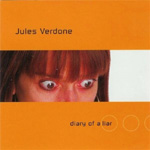 Jules Verdone
Jules VerdoneDiary of a Liar (Q Division) Punk-tinged guitar rock, with a female edge. I know, it's dumb and engaging in stereotypes to say that, but like it or not, there is a genre known as "chick rock" (though I prefer to generally avoid using such a term), and the main feature is somewhat less intense music but more impassioned vocals. The lyrics are somewhat more introspective and talk about emotions as much as anything. Well, Verdone's music is edgy and raucous. While simplistic and direct, Verdone also prefers to use a full range of musical sounds and vocal intensity, which gives the disc a good flow. There is a definite Liz Phair feel to all this, though without all of the self-conscious excesses. Verdone is able to carve out her own sound and get her ideas across. The songs are not as direct and arresting as I'd like, but they are well-constructed. I'm thinking my problem here is mostly one of taste. I like the disc, but it doesn't quite sing to me like I expected it would when I first heard it. Something is being held back, and I'd like to hear that passion released. Still, a solid effort all the way around.
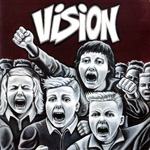 Vision
VisionThe Kids Still Have a Lot to Say (Grilled Cheese-Cargo) A New Jersey hardcore band which, believe it or not, has played York a couple times in the year I've been living here. There's enough tuneage to make some reference to late 80s Bad Religion, say, though the production is certainly more raw and direct. Still, the literately political lyrics and nice lead guitar lines are straight out of Westbeach Recorders. Hey, Vision is pretty damned good at this stuff, really. The sort of amped-up pop-core fare I've been jonesing for for a while. Truly quality work. And the less-than-perfect sound doesn't get in the way. In fact, I'd say the rough edges give the songs a bit more punch. Few oozin-ahs, but plenty of ragged hooks, nonetheless. Completely kicked me in the ass. Not a direct rip-off, but an evolution of the old BR ideal. Beats the shit out of where Graffin and Co. and these days.
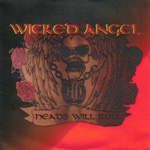 Wicked Angel
Wicked AngelHeads Will Roll (Raven Music Group) Dual lead guitars and a short-cropped blond singer who favors leather? Wow, I haven't heard such a Judas Priest tribute in ages. Rob (another coincidence?) Rose has the perfect droning growl for the sound, and the band cranks through a series of fine melodic metal anthems. And I'm not kidding with the Judas Priest reference. These folks are steeped in the sound. Okay, so Vicki Rose and Dwight Farmer do have their own styles of taking leads, but the rhythm work and general song construction is dead on. There are moments where band breaks out of the mold, in particular the power ballad "Goodbye", which instead apes the Scorpions, complete with that weird German-inflected English singing style that is a Klaus Meine trademark. One I get past the obvious influences, I must say the sound is great. Whoever produced this has a great hand. I'd like to hear more originality. Hey I love this stuff, too, but to really go somewhere a band has to find its own road. Wicked Angel needs to wander down that way.
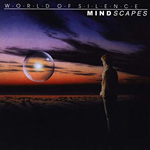 World of Silence
World of SilenceMindscapes (Black Mark Production) Heavy-duty prog metal, following in the fine European tradition that inspired such American bands as Fates Warning and Dream Theater. World of Silence has found a way to make technically superior music that also appeals to a more aesthetic listener. Gorgeous stuff, so much so I didn't even notice how long the songs were (all longer than five minutes, and most closer to 10). Beauty and power in equal measure, all to fine effect. The sound is great as well, providing a lush backdrop for the grand ambitions of the band. Ambitions that are fulfilled. Yeah, this is a bit over-the-top. I don't care. It works for me. This is what power metal is supposed to sound like, achingly brilliant passages wrought with skill and style. For some reason, this puppy sings to me.
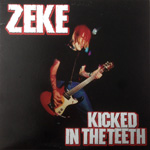 Zeke
ZekeKicked in the Teeth (Epitaph) Seventeen songs clocking in at almost 21 minutes. Breathless is one way to put it. The songs were recorded live to tape, and they sound like it. The liners consist of a long break-up note and an application for a restraining order (for those of you concerned, the two aren't related, whether or not they are actually real). Pure punk spirit infused in straightahead rock. Zeke (it is a band) doesn't slow down for anyone, and the songs bleed directly into one another. No comforting strip of silence between the blasts of sonic violence. An unholy racket, and an unrelenting one at that. Utterly unsophisticated, with not even the slightest hint of subtlety. Methinks this might be one of the purest expressions of the rock spirit I've heard. If so, then it proves the old maxim "rock and roll ain't pretty". In fact, it's a dog-ugly caterwauling dose of angst and lust. No wonder the fundamentalists get so worked up. |
|
return to A&A home page